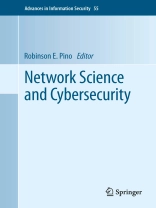Network Science and Cybersecurity introduces new research and development efforts for cybersecurity solutions and applications taking place within various U.S. Government Departments of Defense, industry and academic laboratories.
This book examines new algorithms and tools, technology platforms and reconfigurable technologies for cybersecurity systems. Anomaly-based intrusion detection systems (IDS) are explored as a key component of any general network intrusion detection service, complementing signature-based IDS components by attempting to identify novel attacks. These attacks may not yet be known or have well-developed signatures. Methods are also suggested to simplify the construction of metrics in such a manner that they retain their ability to effectively cluster data, while simultaneously easing human interpretation of outliers.
This is a professional book for practitioners or government employees working in cybersecurity, and can also be used as a reference. Advanced-level students in computer science or electrical engineering studying security will also find this book useful .
विषयसूची
Towards Fundamental Science of Cyber Security.- Bridging the Semantic Gap: Human Factors in Anomaly-based Intrusion Detection Systems.- Recognizing Unexplained Behavior in Network Traffic.- Applying Cognitive Memory to Cyber Security.- Understanding Cyber Warfare.- Design of Neuromorphic Architectures with Memristors.- Nanoelectronics and Hardware Security.- User Classification and Authentication for MOBILE Device Based on Gesture Recognition.- Hardware-based Computational Intelligence for Size, Weight, and Power Con-strained Environments.- Machine Learning Applied to Cyber Operations.- Detecting Kernel Control-flow Modifying Rootkits.- Formation of Artificial and Natural Intelligence in Big Data Environment.- Alert Data Aggregation and Transmission Prioritization over Mobile Networks.- Semantic Features from Web-traffic Streams.- Concurrent Learning Algorithm (CLA) and the Importance Map (IMAP).- Hardware Accelerated Mining of Domain Knowledge.- Memristors and the Future of Cyber Security Hardware.












